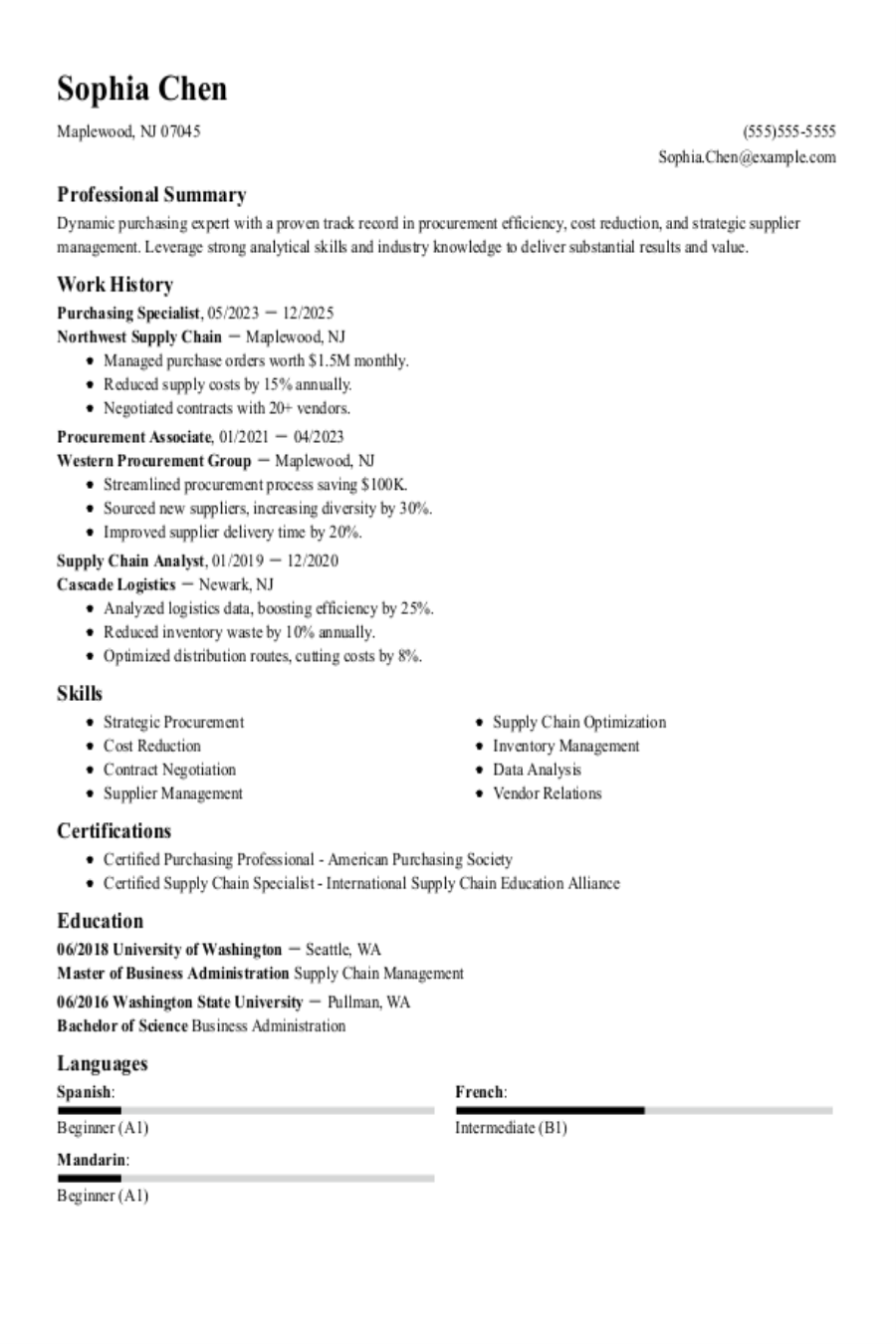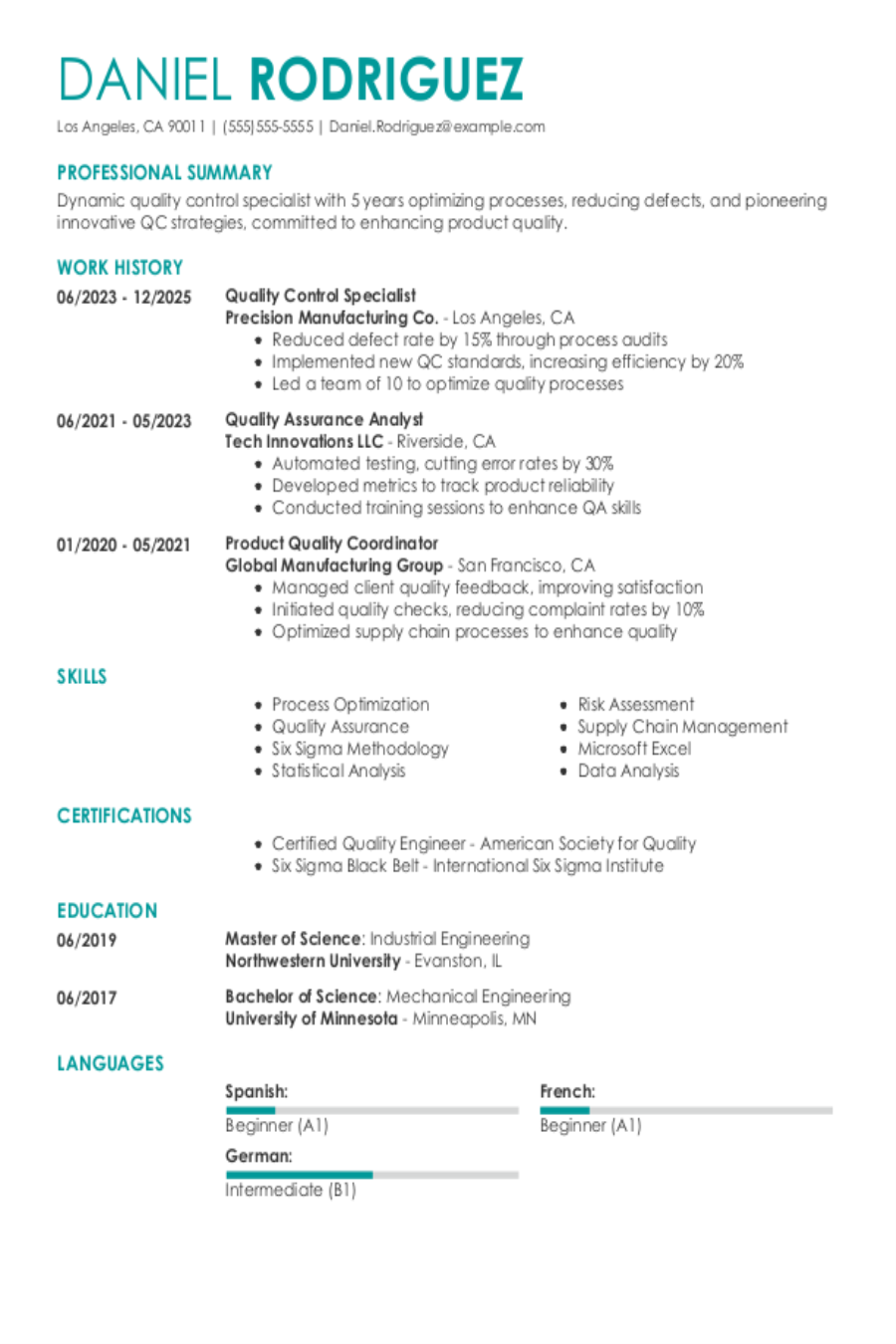Popular Paramedic Resume Examples
Entry-level paramedic resume
An entry-level resume for a paramedic should focus on relevant training, certifications, volunteer experience, and essential skills like emergency response, teamwork, and patient care to demonstrate readiness for the role.
Focuses on goals: The job seeker demonstrates a strong commitment to professional development, highlighted by extensive training and experience in emergency medical services, ensuring readiness to handle critical situations effectively.
Places skills over experience: Choosing a functional resume format is strategic for this entry-level paramedic as it highlights essential skills like advanced life support and trauma management, rather than just chronological experience.
Mid-career paramedic resume
A mid-career paramedic resume should effectively showcase a combination of hands-on experience, critical skills, and ongoing professional development to attract potential employers in the emergency medical services field.
Balances skills and experience: This applicant's resume effectively highlights their advanced skills in emergency care and demonstrates growth from first responder to paramedic, showcasing a solid trajectory of professional development in the field.
Employs active language: Using action verbs such as "reduced," "administered," and "trained" highlights initiative and measurable impact in emergency scenarios.
Experienced paramedic resume
An experienced paramedic resume should highlight relevant certifications, critical skills, and key achievements to clearly demonstrate the job seeker's professional growth and impact in emergency medical services.
Follows traditional format: The chronological resume format effectively showcases the extensive experience of the paramedic, enabling a clear understanding of their career progression and highlighting key responsibilities across various roles in emergency medical services.
Quantifies achievements: Quantifiable achievements, such as managing over 150 emergency calls monthly or training more than 30 EMT recruits, provide concrete proof of your impact. These statistics not only clarify your contributions but also make it easier for recruiters to assess your capabilities.
No experience paramedic resume
A resume for an applicant with no experience should emphasize relevant certifications, volunteer work, and transferable skills to demonstrate the job seeker's commitment and readiness for paramedic services.
Avoids jargon: Job seekers often feel pressured to embellish their experience with complex terms or vague descriptions. However, a straightforward approach that highlights real responsibilities is much more effective and credible, especially in fields like emergency services where clarity is essential.
Overcomes lacking experience: Including volunteer work and extracurricular activities in a resume shows initiative and relevant skills, giving valuable insight into an applicant's dedication to community and teamwork.
More resume examples
Paramedic Resume Template
Looking to craft a standout application? This paramedic resume template is your go-to guide—adapt it with your personal details for a perfect fit.
Ming Huang
Minneapolis, MN 55411
(555)555-5555
Ming.Huang@example.com
Professional Summary
Experienced paramedic skilled in lifesaving procedures, with a seven-year track record in emergency patient care and rapid response, complemented by critical team coordination and advanced first aid skills.
Work History
Paramedic
LifeLine Medical Response - Minneapolis, MN
November 2022 - Current
- Rapid response to 40+ weekly emergencies
- Reduced hospital admission times by 25%
- Trained 15 EMTs in advanced protocols
Emergency Medical Technician
Premier Health Services - Minneapolis, MN
November 2019 - October 2022
- Assisted in treating 100+ patients monthly
- Improved patient transfer efficiency 20%
- Managed equipment worth $50,000
Medical First Responder
Guardian Emergency Care - Minneapolis, MN
November 2016 - October 2019
- Responded to 60+ callouts per month
- Achieved 90% patient satisfaction rate
- Coordinated with team of 6 responders
Skills
- Advanced Life Support
- Emergency Response
- Patient Care
- Team Coordination
- CPR & First Aid
- Quick Decision Making
- Patient Transport
- Medical Equipment Handling
Education
Master's Degree Emergency Medical Services
University of Southern California Los Angeles, California
May 2016
Bachelor's Degree Health Science
San Diego State University San Diego, California
May 2014
Certifications
- Certified Paramedic - National Registry of Emergency Medical Technicians
- Advanced Cardiac Life Support - American Heart Association
Languages
- Spanish - Beginner (A1)
- French - Intermediate (B1)
- German - Beginner (A1)
Must-Have Skills on a Paramedic Resume
A strong skills section is essential for crafting an compelling resume that stands out to employers.
The following data highlights the most prevalent hard and soft skills for a paramedic resume, drawn from Resume Now’s extensive internal resume data.
When you’re ready to improve your resume with key skills, try our AI Resume Skills Generator. It offers tailored suggestions based on your job title, ensuring you create a comprehensive and personalized skill set.
Writing Your Paramedic Resume
Having explored these effective resume examples, you are now prepared to dive into the intricacies of how to write a resume. We'll guide you through each section step by step, ensuring you understand what to include for maximum impact.
List your most relevant skills
An effective skills section for your paramedic resume should clearly highlight both your technical abilities, such as emergency medical care and patient assessment, and essential soft skills like teamwork and communication. By focusing on these areas, you present yourself as a well-rounded applicant ready to face the demands of the job.
To optimize this section, be sure to include keywords from the job listing. This practice not only resonates with human recruiters looking for specific qualifications but also helps your application pass through applicant tracking systems (ATS). When you reflect the language used in the job description, you increase your chances of catching attention and showcasing that you're a perfect fit for the paramedic position.
Example of skills on a paramedic resume
- Trained in advanced life support techniques and emergency response protocols
- Proficient in patient assessment and vital sign monitoring
- Compassionate communicator with strong interpersonal skills
- Adaptable team player who thrives in high-pressure situations
The skills section is important for showcasing your readiness for the paramedic position. It should highlight both the technical skills specified in the job description and essential soft skills. This combination demonstrates to employers that you are fully prepared to meet the demands of the role and provide quality patient care under pressure.
Highlight your work history
Your work experience section is where you can showcase not just your duties, but the powerful achievements that illustrate your skills in high-pressure situations. Highlighting specific incidents or outcomes demonstrates your ability to make quick decisions and provides tangible evidence of your capabilities.
When detailing each job entry, be sure to include critical information such as your title, the name of the employer, and the dates of employment. This information helps establish your professional credibility and allows hiring managers to quickly assess your background. Consider including details about certifications or specialized training relevant to each position as well.
Example of a paramedic work experience entry
- Paramedic
City Emergency Services - New York, NY
June 2019 - Present - Administer advanced life support and basic life support to patients in emergency situations, achieving a patient survival rate of 92%
- Collaborate with multidisciplinary teams during emergency response calls to ensure efficient and coordinated patient care
- Maintain accurate documentation of patient assessments and treatments administered, contributing to improved data accuracy for hospital reviews
- Train new paramedics on protocols, equipment usage, and emergency response techniques, improving team readiness by 30%
- Conduct community outreach programs to educate the public on first aid techniques and CPR, reaching over 500 participants annually
Aim for clarity in your resume by crafting bullet points that are concise yet informative. Focus on key achievements that highlight your skills and impact, ensuring each point adds value without unnecessary embellishments.
Include your education
The education section of your paramedic resume should list your academic credentials in reverse-chronological order, starting with your most recent degree or certification. It's advisable to exclude your high school diploma if you have a higher-level qualification such as an associate or bachelor’s degree. Make sure to highlight any specialized training relevant to emergency medical services.
If you are currently enrolled in a paramedic program or have incomplete education, indicate the highest level achieved and provide an expected graduation date. Including bullet points for relevant coursework can improve this section, particularly if you are a current student or recent graduate.
Common certifications for a paramedic resume
- Emergency Medical Technician (EMT) – National Registry of Emergency Medical Technicians (NREMT)
- Paramedic National Certification – National Registry of Emergency Medical Technicians (NREMT)
- Advanced Cardiac Life Support (ACLS) – American Heart Association (AHA)
- Pediatric Advanced Life Support (PALS) – American Heart Association (AHA)
Sum up your resume with an introduction
Creating a compelling profile section on your paramedic resume is essential for making a strong first impression. This part of your resume serves as an introduction to your career, helping potential employers quickly grasp what you bring to the table and why you would be a great fit for their team.
If you have extensive experience in the field, consider using a professional summary. This approach allows you to showcase your most significant accomplishments and relevant skills at the top of your resume, giving hiring managers immediate insight into your qualifications and expertise. If your professional experience is minimal, write a resume objective that shows your intent to grow and contribute.
Professional summary example
Compassionate paramedic with over 5 years of experience in high-pressure emergency medical services. Demonstrated ability to deliver rapid, effective patient care while coordinating with healthcare teams for optimal outcomes. Proficient in advanced life support techniques, triage assessment, and trauma response, consistently ensuring the highest standards of safety and patient well-being.
Resume objective example
Enthusiastic paramedic eager to use strong communication, critical thinking, and teamwork skills to improve patient care in a fast-paced emergency environment. Committed to providing timely and effective medical assistance while supporting the overall mission of the healthcare team.
Your resume profile is your prime chance to incorporate relevant keywords for a paramedic position. Carefully analyze the job description and weave critical qualifications into your introduction to ensure it passes through the ATS filters used by employers.
Add unique sections to set you apart
Incorporating optional resume sections can help you stand out as a paramedic applicant by showcasing your unique qualifications. These sections allow you to highlight experiences that may not fit neatly into traditional categories.
By including relevant hobbies or volunteer work, you provide insight into your personal values and skills. For instance, if you volunteer with local health initiatives, it illustrates your commitment to community service. Additionally, sharing activities like participating in first aid training demonstrates your dedication to continuous learning.
Three sections perfect for a paramedic resume
- Languages: As a paramedic, clear communication is essential, especially when interacting with diverse patients. Highlighting your language skills on your resume can improve patient care and improve outcomes in critical situations.
- Volunteer Work: Including volunteer work on a resume not only showcases your dedication to helping others but also highlights valuable skills that improve your professional profile. It demonstrates your commitment and passion for community service.
- Accomplishments: As a paramedic, quantifiable accomplishments are vital to demonstrating your effectiveness in emergency situations. Include these achievements in your job descriptions or create an accomplishments section to spotlight them.
5 Resume Formatting Tips
- Choose a format that matches your career stage.
When crafting your resume, consider your experience level. If you have a wealth of field experience, a chronological resume format showcases your career progression effectively. For those just starting out, a functional resume can highlight relevant skills and training. Opt for a combination approach if you want to emphasize both your experience and abilities.
- Pick a smart resume template.
Select a professional resume template to ensure your qualifications are easily readable. A clean format highlights your skills quickly, making it simple for potential employers to assess your suitability for the role.
- Select an appropriate font.
Choose a professional font like Arial, Calibri, or Verdana to improve resume readability. These fonts ensure your information is easily accessible for both ATS and hiring managers.
- Use consistent formatting.
Align your resume to the left and maintain uniform margins. This creates a clean, organized look that improves readability and showcases your professionalism.
- Keep your resume to one or two pages.
When crafting your resume, keep in mind that resumes should be one page long unless you have extensive experience. Focus on concise and relevant content to highlight your strengths effectively.
What’s the Average Paramedic Salary?
Paramedic salaries vary based on location, career level, and qualifications.
This data, provided by the Bureau of Labor Statistics, will show you expected salary ranges for paramedics in the top 5 highest-paying states, including the District of Columbia. The figures reflect the most current salary data available, collected in 2024.
- Full Range
- Most Common (25th–75th percentile)
- Average
Washington
Most common: $76,120 - $127,120
New Jersey
Most common: $74,670 - $84,160
District of Columbia
Most common: $66,330 - $86,920
California
Most common: $60,920 - $84,940
Alaska
Most common: $60,250 - $79,900
Tools for Your Job Search
Are you ready to advance your career as a paramedic? Before you hit send on your job applications, consider using our ATS Resume Checker. This essential tool provides insights into how well your resume will perform with the automated systems that many emergency services use for initial screenings.
Looking to improve your application even further? Our AI Resume Builder offers tailored recommendations specifically for paramedics, along with professional templates designed to showcase your skills and experiences effectively.
Frequently Asked Questions
Last Updated: October 29, 2025
Yes. A cover letter is important as it adds depth to your resume, offering a personal touch and a chance to communicate directly with employers. It allows you to express your passion for the paramedic role and highlight why your unique skills make you the ideal job seeker. Take the initiative—write a cover letter that sets you apart.
Consider using our AI Cover Letter Generator for quick and efficient creation of personalized cover letters. With matching cover letter template options, you can ensure your application presents a cohesive professional image, making it easier to captivate potential employers.
A resume is typically a concise document, spanning one to two pages, highlighting your key skills and experiences relevant to the job you're applying for. In contrast, a CV (curriculum vitae) can extend several pages, providing comprehensive details about your academic achievements, research contributions, publications, and professional history.
You should use a CV when applying for specialized roles in academia, science, law, or medicine. If you need to create a tailored CV quickly and efficiently, our online CV Maker service offers various CV templates suited for different industries and career levels. Start crafting your standout CV today with our user-friendly options!
When addressing gaps on your resume, be honest about the reasons behind them. Whether you took time off for personal matters or further education, make it clear how you used that time productively. Focus on showcasing any skills or experiences gained during that period. After explaining the gap, steer the conversation back to your qualifications and relevant experience to demonstrate your readiness for the role.
To improve your paramedic resume, focus on highlighting the essential skills that match the specific position you're targeting. Review job listings for relevant keywords and incorporate these into your resume. This approach will clearly demonstrate how your experience aligns with the role's requirements.
To ace your paramedic interview, practice job interview questions and answers. This preparation not only boosts your confidence but also equips you to handle any surprises that may come your way during the conversation.
Was this information helpful? Let us know!
Hailey is a career advice writer dedicated to helping job seekers excel in their careers.
More resources

Best Resume Font for 2026 (+ Size and Formatting Tips)
Find the best resume font for your resume with our comprehensi...

How to Write a Resume: Guide & Examples for 2026
If you re wondering how to write a resume that grabs attenti...

Plumbing Resume: Examples & Templates
As a plumbing professional you need a resume that captures th...

Purchasing Resume: Examples & Templates
As a purchasing professional you need a resume that captures ...

Quality Control Resume: Examples & Templates
As a quality control professional you need a resume that high...


